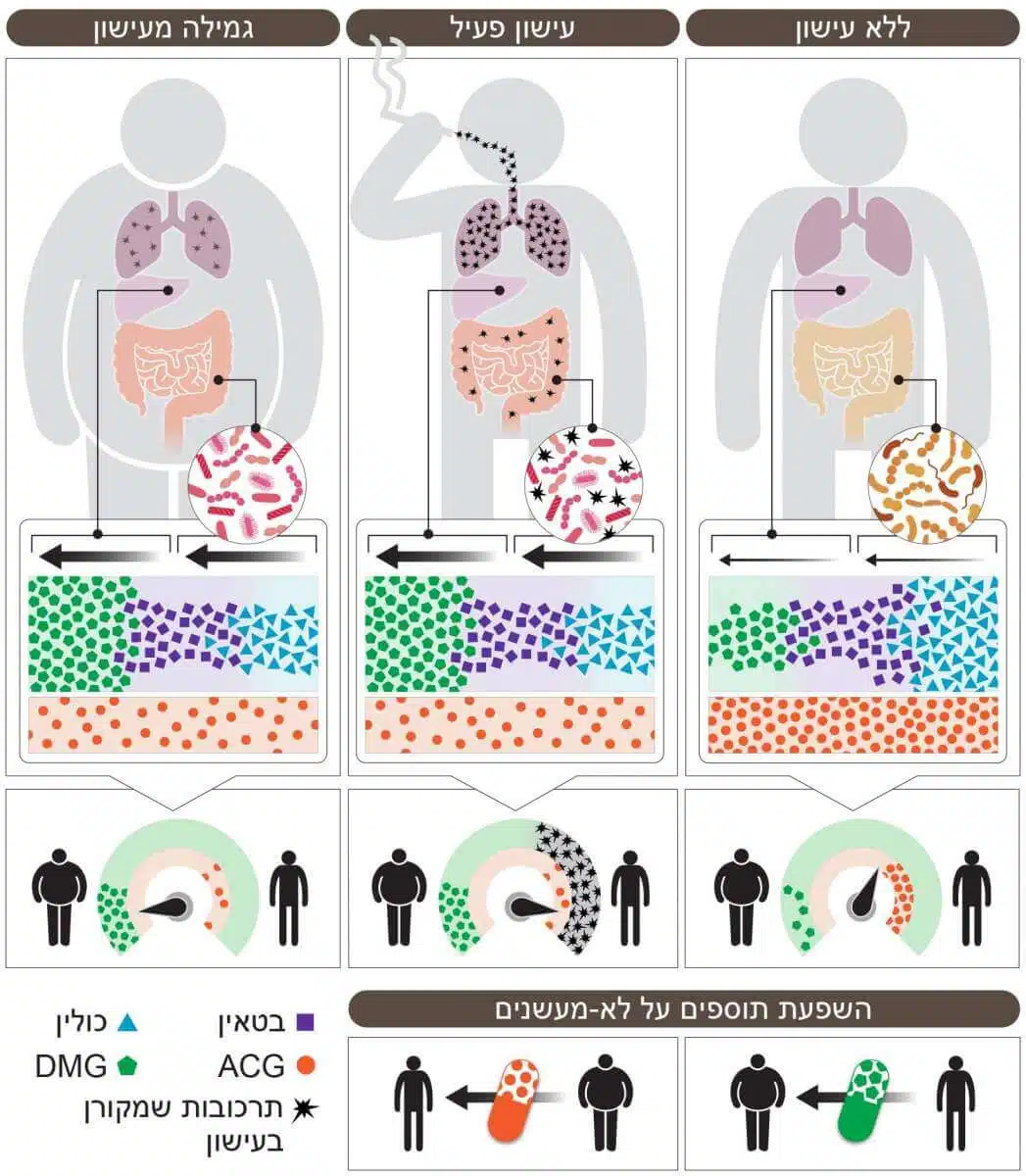Nicotine and other compounds found in cigarettes penetrate the intestine through the bloodstream and change the composition of the intestinal bacteria and their products

Even in 2021, more than a billion people around the world smoke cigarettes - a harmful and even deadly habit that leads to great morbidity and more than six million deaths per year. Unfortunately, however, many avoid quitting for fear of gaining weight. The reasons for this obesity are unknown - and previous studies have even shown that it is not usually due to overeating. In a new study in mice and humans published today in the scientific journal Nature, Weizmann Institute of Science scientists direct the spotlight to the intestinal bacteria and the possible involvement of compounds they secrete in obesity resulting from smoking cessation; The compounds identified in the study may be an opening for new anti-obesity treatments - with and without smoking.
The research team led by Labial Flor, Uriah Mor and Dr. Hagit Shapira from the laboratory of Prof. Eran Alinev In the department of immunology at the institute, he first showed that laboratory mice exposed to cigarette smoke maintained their weight even though they ate food high in fat and sugar. However, like humans, when their exposure to smoke was stopped, they rapidly gained weight. This obesity was much milder when the cessation of exposure to cigarette smoke was accompanied by the administration of antibiotics that harm the population of intestinal bacteria (the microbiome). Following these findings, the researchers showed that nicotine and other compounds related to smoking penetrate the intestine through the bloodstream and affect the composition of the bacteria and their products, and as a result, also the metabolism of "smoking" mice.

To check if the cause of the obesity that develops due to smoking cessation does indeed involve the intestinal bacteria, the scientists sampled the composition of the microbiome at different time points throughout the exposure of the mice to cigarette smoke, and also after the cessation of exposure, and implanted the samples collected in "sterile" mice - mice that were raised in a special facility, without bacteria in their bodies - who were not exposed to cigarette smoke at all. To the researchers' surprise, the mice in which bacterial samples from mice exposed to cigarette smoke were implanted gained more weight than mice in which samples from mice not exposed to smoking were implanted; The most significant weight gain was seen in mice that were implanted with samples taken from mice that had just stopped smoking. On the other hand, transplanting samples from mice exposed to smoking, but treated with antibiotics that depleted their bacterial population, led to much milder weight gains.
Later, the scientists mapped the effect of smoking on the various substances produced by intestinal bacteria (metabolites) and identified two small molecules whose level changes following exposure to smoking may explain the effects of quitting smoking on the body's metabolism: the first is dimethylglycine, or DMG for short, which is produced in our bodies from the compound choline which comes from the food we eat, in a joint process involving the gut and liver bacteria. During exposure to cigarette smoke, gut bacteria increased the process of DMG production, but this decreased when the bacterial population was compromised following antibiotic treatment. Also, in smoking mice that were treated with antibiotics (and therefore their DMG levels were depleted), administration of a DMG supplement resulted in the resumption of weight gain immediately upon cessation of smoking, despite exposure to antibiotics. In contrast, mice that were exposed to smoking and consumed a choline-free diet - that is, they did not have the raw material needed to produce DMG - did not gain weight following smoking cessation. The weight gain observed following the administration of DMG was caused by the increased "energy harvest" in the body, that is, the amount of energy produced from the food we eat.
The action of the second molecule, acetyl glycine, or ACG, was the opposite: ACG levels decreased during exposure to cigarette smoke and after cessation of exposure, and rose back to their high level after antibiotic treatment. While smoking mice, in which the level of ACG is low, recorded a significant weight gain when the exposure to smoke stopped, smoking mice that received an ACG supplement, did not gain weight even after they stopped smoking. From this it was possible to conclude that ACG helps with weight loss, while the decrease in the level of the molecule during exposure to smoking contributes to the excessive weight gain that develops when smoking is stopped.
Moreover, the scientists showed that the two molecules affect body weight regardless of smoking: the DMG supplement led to a moderate weight gain even in "non-smoking" mice, while the ACG supplement led to a significant weight loss and an improvement in other metabolic indices even when given as a supplement to obese mice that had never been exposed to smoke cigarettes. Genetic analysis of the adipose tissue of the mice indicated that DMG and ACG cause opposite effects - one activates a genetic program associated with obesity, and the other, a program associated with weight loss. Further studies will be able to determine the mechanisms by which these molecules affect metabolism in mammals.
In the last phase of the study, the scientists examined the intestinal bacteria of 96 people, smokers and non-smokers, and found clear differences between the two groups in the intestinal bacteria and their products, including those involved in the breakdown pathway of choline - changes reminiscent of the findings in mice.
Gut bacteria have far-reaching effects
"The far-reaching effects of our gut bacteria never cease to amaze us," says Prof. Alinev. "The new findings shed light on how interactions between gut bacteria and our body regulate weight and metabolism, and how this effect can be harnessed for the purpose of developing innovative treatments for the obesity epidemic."
Dr. Alexandra Kolodzika, Dr. Meli Dori-Bachsh, Dr. Avner Leshem, Dr. Yotam Suetz, Dr. Niv Zamora, Dr. Raphael Valdes Maas, Dr. Denis Koiatkowski, and Shlomik Itav also participated in the study. , Yotam Cohen, Claudia Morsi, Shahar Molina, Niv Ilon, Shani Hornstein, Hodia Karbi, Adi Livna, Orali Bukimer, Shimarit Eliyahu Miller and Alona Metz from Prof. Alinev's laboratory; Dr. Alexander Brandis and Dr. Tebi Melman from the Department of Life Science Research Infrastructures of the Institute; and Dr. Yael Kuperman, Dr. Michael Tzuri, Dr. Noa Stettner and Prof. Alon Hermlin from the veterinary resources department of the institute.
